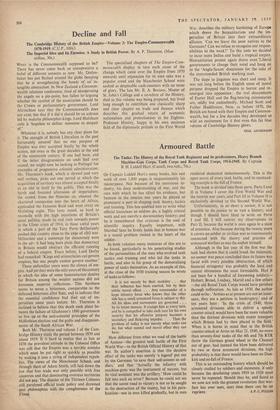Decline and Fall
The Cambridge History of the British Empire—Volume 3: The Empire-Commonwealth 1870-1919. (C.U.P., 100s.) The Imperial Idea and Its Enemies: A Study in British Power. By A. P. Thornton. (Mac- millan, 30s.) WHAT is the Commonwealth supposed to be? There has never come back so unimpressive babel of different answers as now. Mr. Diefen- baker has just flashed around the globe boasting that he is strengthening the bonds of an in- tangible abstraction. In New Zealand a Common- wealth relations conference, tired of enumerating the angels on a pin-point, has fallen to arguing whether the symbol of the association should be the Crown or parliamentary government. Lord Altrincham says that the Commonwealth does not exist, but that if it did it should be an ashram led by mulatto philosopher-kings. Lord Hailsham calls it 'hopeless to define; nonsense to despair of.'
Whatever it is, nobody has any clear plans for it. The strength of British Liberalism in the past fortunately ensured that no one purpose of Empire was ever accepted finally by the whole nation, not even in the great decades at the end of the nineteenth century. If one had been, and if the bitter disagreements on ends had ever ceased, 'we might now be looking to Portugal' for examples of progressive colonial administration. Mr. Thornton's book, which is shrewd and very well written, picks out one period at which the acquisition of territory was almost accepted finally as an end in itself by the public. This was the harsh and frenzied afternoon of imperialism; the crowd, from the Nineties on, cheered the chartered companies into the heart of Africa, applauded the Jameson Raid and went crazy on Mafeking night. This lusty mood, so hard to reconcile with the high intentions of Britain's usual politics, made its real rush towards power in the Ulster crisis of 1914, in those awful years in which a part of the Tory Party deliberately pushed this country close to the edge of civil war. Militarism and a contempt for democracy were in the air : it had long been plain that democracy in Britain would obstruct the efficient running of a federal empire. Years before, Lord Derby had remarked: 'Kings and aristocracies can govern empires, but one people cannot govern another.'
Those unfamiliar years were the climax of em- pire. And yet they were the only years of the century in which the idea of some humanitarian destiny for Britain among the weaker nations did not dominate imperial reflections. This hardness seems to mean a bitterness, comparable to the defeated bitterness after Suez, and to indicate that the essential confidence had died out of im- perialism some years before. Mr. Thornton is inclined to believe that this death took place be- tween the failure of Gladstone's 1880 government to live up to the anti-colonial principles of the Midlothian election and the guilts and disappoint- ments of the South African War.
Both Mr. Thornton and volume 3 of the Cam- bridge History study the period between 1870 and about 1919. It is hard to realise that as late as 1870 the prevalent attitude in the Colonial Office was still that the Empire was a terrible mistake which must be put right as quickly as possible by making it into a string of independent repub- lics. The views of the Manchester School, and through them of Adam Smith, still laid down the law that free trade was only possible with free countries and that dominating overseas territories did not pay. The disaster of the Thirteen Colonies still paralysed official trade policy and drowned past philosophies with the completeness of the Flood.
The specialised chapters of The Empire-Com- monwealth display in turn each cause of the change which came over, the Empire from 1870 onwards until expansion for its own sake was a popular creed and the Manchester School were sacked as despicable cash-counters with no sense of glory. The late Mr. E. A. Benians, Master of St. John's College and a co-editor of the History, died as this volume was being prepared, but lived long enough to contribute one classically sharp and clear chapter on trade and finance which describes this gradual return of economic nationalism and protectionism in the Eighties. Professor Hinsley, happy in his own ominous field of the diplomatic prelude to the First World
War, describes the military hardening of Europe which drove the humanitarians and the im- perialists of Britain into their extraordinary alliance. 'Can we leave the poor natives to the Germans? Can we refuse to recognise our respon- sibilities to the weak?' To this note we decided to incur more Indias and build a tropical empire. Humanitarian protest again drove even 'Liberal governments to change their mind and hang on to the 'Anglo-Saxon' dominions for the sake of the overcrowded British working man.
The slope to jingoism was short and steep. It was not long before the English sense of moral purpose dropped the Empire in horror and re- emerged into opposition : the real descendants of Exeter Hall and the flag-bearing missionaries are, oddly but undoubtedly, Michael Scott and Father Huddleston, Now, as before 1870, the British are bored with their Empire and Common- wealth, but for a few decades they developed so wild an excitement for it that even this fat blue volume of Cambridge History glows.
NEAL ASCHERSON










































 Previous page
Previous page